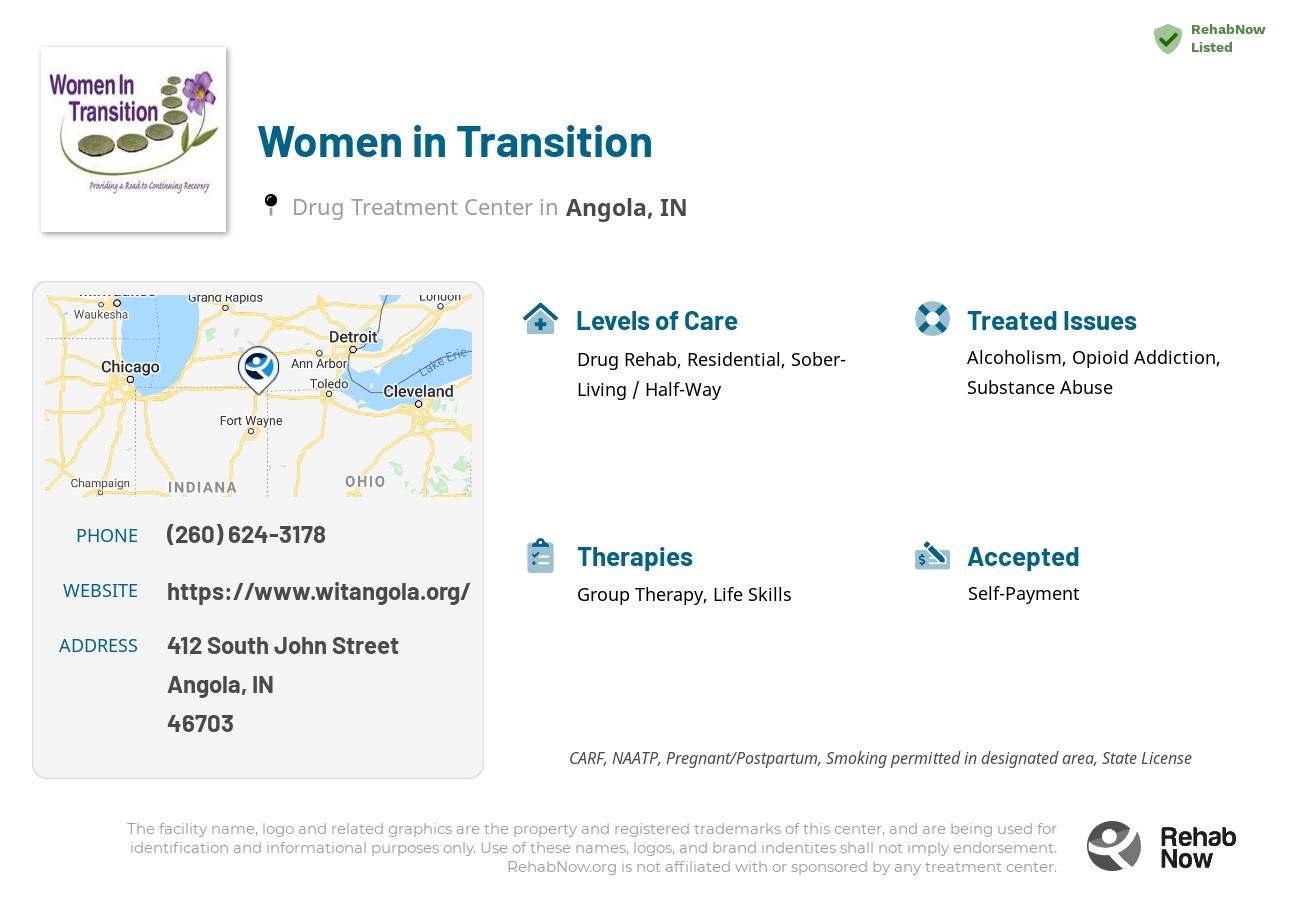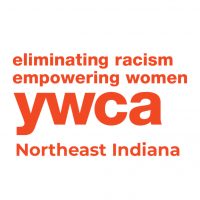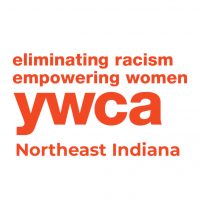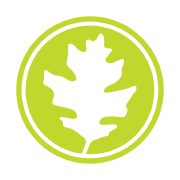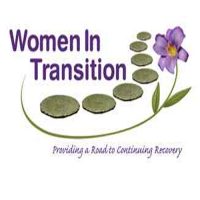
Women in Transition
Drug Rehab Center in Angola, Indiana
- Substance Abuse
- Opioid Addiction
- Dual Diagnosis
- Drug Addiction
- Alcoholism
This addiction treatment facility, accredited by the state of Indiana, provides comprehensive and personalized programs for individuals in need of sobriety and recovery by offering 20 beds in residential, drug rehab, and sober-living/half-way care levels of care.
About Women in Transition in Indiana
Women in Transition is an addiction treatment facility located in Angola, Indiana. Established in 2003, this facility specializes in providing comprehensive care for individuals suffering from alcoholism, opioid addiction, substance abuse, dual diagnosis, and drug addiction. With a focus on promoting healing and recovery, Women in Transition offers a range of services including drug rehab, residential treatment, and sober-living or half-way house levels of care. This facility is accredited by State License, ensuring that they meet the necessary standards and regulations required for providing effective addiction treatment.
At Women in Transition, individuals struggling with addiction can access a variety of services to support their recovery journey. Whether battling alcoholism, opioid addiction, substance abuse, or drug addiction, this facility offers personalized treatment plans tailored to meet individual needs. Through their drug rehab program, individuals can receive specialized therapy, counseling, and medical support to overcome addiction. The residential treatment option provides a structured environment for intensive care and round-the-clock support. Additionally, Women in Transition offers sober-living or half-way house levels of care, providing a safe and supportive environment for individuals transitioning back into society following treatment.
Genders
Ages
Modality
Additional
Accreditations
State License
Conditions and Issues Treated
Many people need to recover from substance abuse to live a healthy life. In the end, if you can get through all the steps: detoxifying your body, rehabilitation after some time or when needed (depending on the type), and recovery while also receiving therapy support throughout the process, it can be worth it.
A detoxification center is a common place to start the recovery process from substance abuse. With your body and mind restored, you can continue to heal without the lingering effects of drugs.
Many people who struggle with opioid addiction need to attend specific programs like methadone , Suboxone or Vivitrol clinics.
These types of programs will provide the patient with legal, prescription medications that can help them overcome their cravings for illegal opioids like heroin or fentanyl . If the patient has a chronic condition like Hepatitis C, they must undergo treatment before they can begin taking these medications.
Levels of Care Offered
This center offers a variety of custom treatment tailored to individual recovery. Currently available are Drug Rehab, Residential, Sober-Living / Half-Way, with additional therapies available as listed below.
Sober Living Homes are an option for those who have completed a treatment program within the past several months. However, it isn’t advisable to use this as a permanent living arrangement because it can lead to a relapse .
The goal of a sober living home is to provide a supportive environment for recovering addicts so they don’t need to return to their previous lifestyles. The homes will not accept residents who are still using drugs or alcohol, and those living in the house must follow a set of rules dictating how they should behave to avoid relapsing.
Residential treatment programs are those that offer housing and meals in addition to substance abuse treatment. Rehab facilities that offer residential treatment allow patients to focus solely on recovery, in an environment totally separate from their lives. Some rehab centers specialize in short-term residential treatment (a few days to a week or two), while others solely provide treatment on a long-term basis (several weeks to months). Some offer both, and tailor treatment to the patient’s individual requirements.
Therapies & Programs
Group Therapy is utilized by drug treatment centers like Women in Transition to provide the recovering drug addict with a platform to talk about their feelings and experiences. It also provides for an opportunity to learn from other addicts who have successfully overcome their addiction.
Group Therapy is employed in lectures, seminars, or discussion groups (the latter two are typically conducted as “therapy groups”). It is recommended that all group members be recovering addicts for this type of therapy to work (though it does not exclude others with lived experience).
Dialectical Behavior Therapy (DBT) is used by drug treatment centers across the United States to help drug addicts become sober. DBT combines traditional behavioral treatments with elements from DBT, including dialectics, distress tolerance, and interlocking issues. It is commonly used to treat Borderline Personality Disorder (BPD) along with substance abuse disorders. The four DBT modules are mindfulness, interpersonal effectiveness, emotion regulation, and distress tolerance.
Cognitive behavioral therapy is also a popular service for individuals living with addiction. This type of supportive treatment uses both one-on-one counseling and group sessions to teach addicts how to identify thoughts, behaviors and emotions that might increase their risk of relapse.
These professionals can help addicts develop coping skills for managing stress, improving self-esteem and overcoming triggers. They might also use behavioral therapy to help addicts learn how to avoid cravings and warning signs that could lead them back into addiction.
Therapy can be used as a step-down from inpatient treatment or as the primary method of overcoming an addiction. No matter which option is best for the addict, they will teach important emotional coping techniques, which can make it easier for addicts to get through the tough days.
Training in improved life skills helps those recovering from addiction feel more capable of self-care. Women in Transition are daily skills that give the person the tools they need to survive.
The therapy covers practical activities like cooking, job hunting, social interaction, and money management, helping to fill in the knowledge gaps caused by addiction.
These life skills help the person self-manage their recovery and stay on track. It also reduces relapse risk as they gain confidence in their day-to-day abilities.
12-Step Program is used by drug treatment centers to get addicts sober. The 12 steps typically begin with addicts admitting they need help. They will work through physical withdrawal symptoms, identify the problems that led to their addiction and learn how to resist cravings. It is often used as a part of an inpatient or outpatient treatment program and is frequently recommended by doctors.
Payment Options Accepted
For specific insurance or payment methods please contact us.
Additional Details
Specifics, location, and helpful extra information.
Angola, Indiana 46703 Phone Number(260) 624-3178 Meta DetailsUpdated November 25, 2023
Staff Verified
Women in Transition Patient Reviews
There are no reviews yet. Be the first one to write one.
Angola, Indiana Addiction Information
The state of Indiana ranks 14th in the nation for drug abuse, but 17th for drug overdoses. The state has many high-quality rehabilitation centers, but reports show that there are about 20 deaths per 100,000 people. This is due to its location making it a drug trafficking haven, where many drugs are further distributed into the country.
Treatment in Nearby Cities
- Wabash, IN (72.0 mi.)
- Newburgh, IN (285.4 mi.)
- Terre Haute, IN (196.5 mi.)
- Lagrange, IN (21.9 mi.)
- Tell City, IN (271.4 mi.)
Centers near Women in Transition

The facility name, logo and brand are the property and registered trademarks of Women in Transition, and are being used for identification and informational purposes only. Use of these names, logos and brands shall not imply endorsement. RehabNow.org is not affiliated with or sponsored by Women in Transition.


